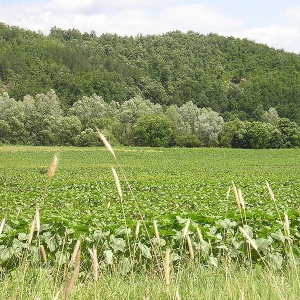
A recent study from the Tyndall Centre for Climate Change Research finds that the UK is failing to make the most of its abundant biomass potential. The researchers found that almost half, up to 44%, of the UK's energy could be produced within the country by using biomass sources, including household waste, agricultural residues and home-grown biofuels. The UK currently produces about half of the food it consumes, and is ~60% ‘self-sufficient’. Although complete food self-sufficiency is not the current goal, the researchers stress that improved food system adaptive capacity is important if the UK is to cope with future stresses in the food system.
Adding to the debate on 'sustainable intensification' and agricultural productivity the paper analyses the UK’s projected biomass resource availability under different future contexts and constraints. The scenarios analysed are:
• Food focus scenario—where emphasis on UK food security and productivity is prioritised;
• Economic focus scenario—where the UK places future emphasis on economic development and resource competition with the bioenergy sector occurs;
• Conservation focus scenario—where the conservation of land, biodiversity and resources are prioritised;
• Energy focus scenario—where the UK places future emphasis on developing the bioenergy sector and mobilising biomass resource to meet energy/bioenergy targets.
Abstract
The UK has legally binding renewable energy and greenhouse gas targets. Energy from biomass is anticipated to make major contributions to these. However there are concerns about the availability and sustainability of biomass for the bioenergy sector. A Biomass Resource Model has been developed that reflects the key biomass supply-chain dynamics and interactions determining resource availability, taking into account climate, food, land and other constraints. The model has been applied to the UK, developing four biomass resource scenarios to analyse resource availability and energy generation potential within different contexts. The model shows that indigenous biomass resources and energy crops could service up to 44% of UK energy demand by 2050 without impacting food systems. The scenarios show, residues from agriculture, forestry and industry provide the most robust resource, potentially providing up to 6.5% of primary energy demand by 2050. Waste resources are found to potentially provide up to 15.4% and specifically grown biomass and energy crops up to 22% of demand. The UK is therefore projected to have significant indigenous biomass resources to meet its targets. However the dominant biomass resource opportunities identified in the paper are not consistent with current UK bioenergy strategies, risking biomass deficit despite resource abundance.
Citation
Welfle A., Gilbert P., Thornley P, 2014, Securing a bioenergy future without imports, Energy Policy, http://dx.doi.org/10.1016/j.enpol.2013.11.079.
Access the full journal article here and read more about the study on Manchester university's website here.
Read more about bioenergy and food security on our website here and here.







Post a new comment »